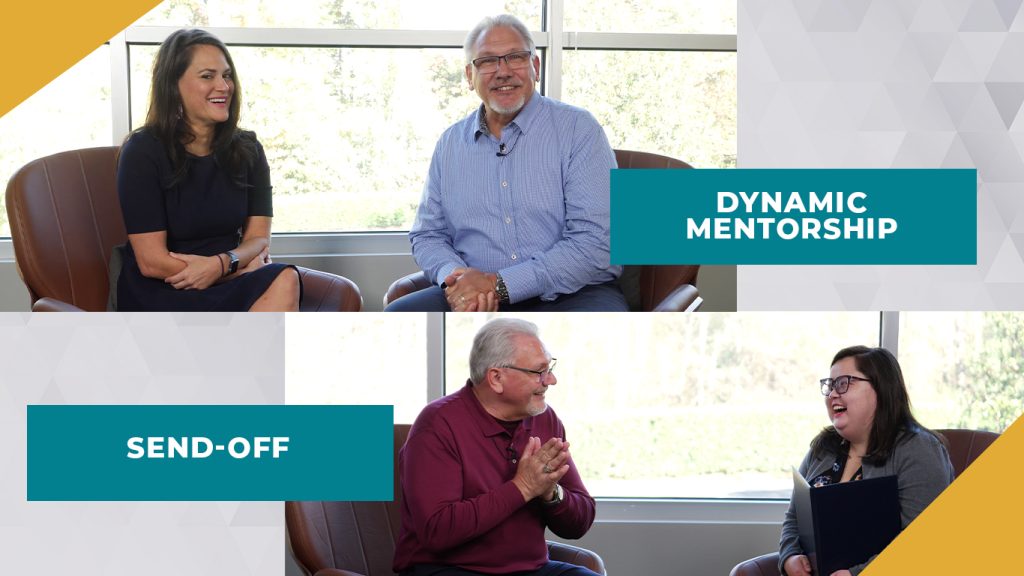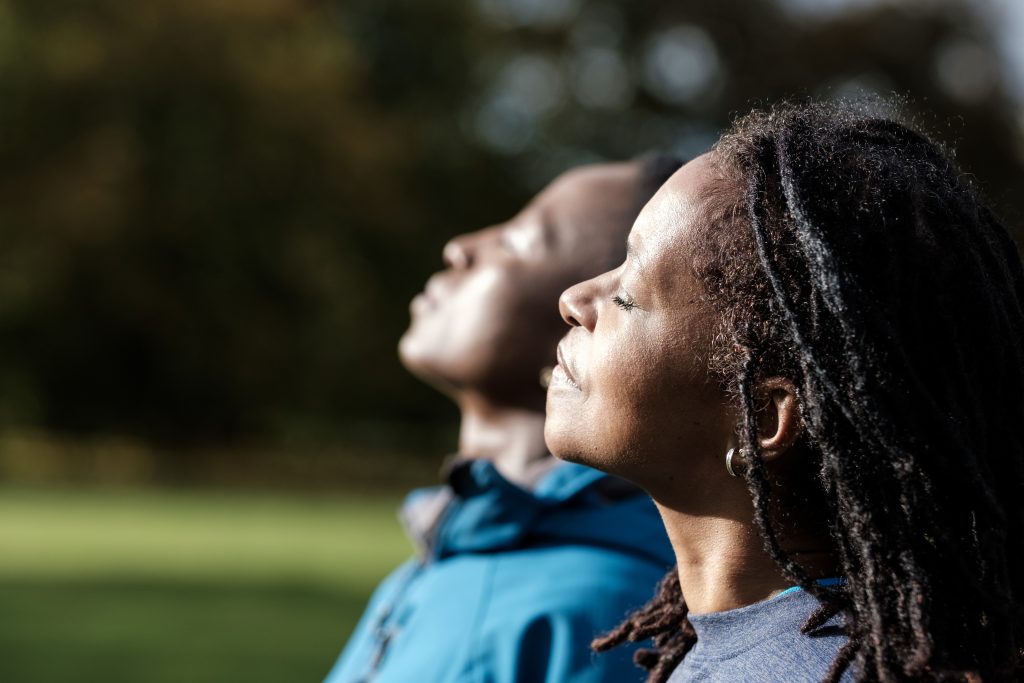John MacMurray—Year B Propers 13-16
Welcome to the Gospel Reverb podcast. Gospel Reverb is an audio gathering for preachers, teachers, and Bible thrill seekers. Each month, our host, Anthony Mullins, will interview a new guest to gain insights and preaching nuggets mined from select passages of Scripture in that month’s Revised Common Lectionary.
The podcast’s passion is to proclaim and boast in Jesus Christ, the one who reveals the heart of God, Father, Son, and Holy Spirit. And now onto the episode.
Anthony: Hello friends and welcome to the latest episode of Gospel Reverb. Gospel Reverb is a podcast devoted to bringing you insights from Scripture found in the Revised Common Lectionary and sharing commentary from a Christ-centered and Trinitarian view.
I’m your host, Anthony Mullins, and it’s my joy to welcome our guest, John McMurray. For over 45 years, John has taught the Bible, theology, and photography in churches and schools, serving in both staff and non-staff leadership roles. Known best for communicating with university age students, he has led college groups, served as an adjunct professor of Bible Literature, and taught for various school and organizations internationally.
And a lifetime of teaching led John to start and direct the Northwest School of Theology and the Open Table Conferences. John is also an award-winning landscape nature photographer. Somewhat of a rarity in the world of professional photographers, he still captures images on film using a large format camera. I love it, John — old school! His images have appeared in Sierra Club, National Geographic, and Audubon.
So, John, thanks for being with us and welcome to the podcast. And since this is your first time on Gospel Reverb. We’d love to know you a little bit about your story and how you’re joining with Jesus these days.
John: Thanks, Anthony. It’s a pleasure to be here. It’s a privilege to be here. Boy, we could spend a lot of time on just the first question, but we won’t. I’ll just maybe go through a couple of quick things. I went to a Bible college and worked in ministry for about four years. Went on after that to seminary, and then after seminary, I took another position in ministry pastoring in a church with a couple other of people.
And about two years after that, all during that time, Anthony, I felt unsettled. And what it was I just felt like I loved the idea of talking to people about Jesus and theology and philosophy and their worldview and just how they’re living, all that kind of stuff. Especially, like you mentioned earlier, with university students, because those are the people that I think a lot of times are just asking a lot of questions and trying to figure out who they are and what life’s about. And so there seems to be a more openness and a more willingness to communicate, to talk about it.
I would do that, and I love doing that, but I just had this unsettledness about ministry as a job, as a vocation, like taking a paycheck from it. And so, I quit, and I became a nature photographer, and that’s been my career. That’s how I’ve made a living, but I continued to do ministry as a volunteer throughout my life.
And as you said, that led me to starting, back in 2007, the school, Northwest School of Theology, which is a week-long intensive. And we bring in teachers, speakers, authors and ask them to talk about something, put it on the table so that we can discuss it.
It’s not a lecture thing. It’s not a “here, I’m going to share with you all of my research, and I want you to agree with me.” It’s really open, and every question is welcomed. We want it to be a place where maybe you haven’t been allowed to ask questions before, but this is a place where you can, and you’ll be treated with dignity and respect.
Because I don’t think God’s afraid of questions. I just don’t. I think that’s the nature of relationship, isn’t it? It’s communication and sharing in what we’re learning and thinking, so that it actually transforms our lives. So, we welcome that.
And I started that back in 2007 because I was involved with some people over in Europe in a mission and they wanted to put something together like a — I don’t even know what to call it; they called it creech. That was the word they had. That’s a Slovene word. But the idea was just for the young people to have a place where they could go. And if they wanted to dig deeper into the Scriptures or what they mean and what it means to their life, this was something they could do.
And so, I helped them do it, and on the way back home to the States, I was thinking this was great. I love this idea, and I wonder if anybody’s doing it back where I live. And so I poked around a bit, couldn’t find anybody. So, I decided to try and start this, doing it on my own. That was 2007, and we’ve been doing it ever since.
And the Open Table Conference grew out of that. And I’ll just say this real quick. I think the thing that makes it unique, because there are a lot of — I don’t know, I don’t even know what to call them — just conferences. The amount of information that’s available to you on the internet, you’ll never get through it all in your lifetime.
So, it’s not like we needed another thing. But what I didn’t find was a panel of people trying to facilitate a discussion about something on a regular, consistent, continuous basis. It was always a single individual, more of a lecture. That’s the default mode almost of how at least I learned when I went to school.
And I just felt like there’s a better way to do it. So instead of having, say, one teacher reflect and teach you what they learned from studying the book of John, you have six teachers discussing what they’ve all learned so that you have the opportunity to hear this back and forth of pros and cons of different thoughts and perspectives so that the Spirit can lead you.
I just think that’s just a better way to do it. There’s people who don’t agree and that’s fine. There’s people who do and those are the people that come and then enjoy the conferences and the classes and discussions that we offer online. So that’s what I’m doing. That’s not really your question though.
You’re asking me how I’m participating, and I don’t necessarily see what I would call my activities as the only way or the exclusive way in which I would participate. I think participation is much more — I’m trying to think of the right word here too, I was going to say banal, but that’s not the right word.
It’s just more down to earth. It’s just loving people and being loved and living in the world and bearing witness to the love that has captured your heart. That’s how I’m participating. And sometimes that comes out in the activity of an online discussion. Sometimes it comes out because I mow the lawn for my neighbor.
Does that make sense? I don’t know if I’m making sense there with that.
It does. You mentioned relationship with the School of Theology that it isn’t relationship unfolding. It’s a process of discovery and we’re in relationship with the triune God by the Spirit.
[00:08:10] Anthony: And it’s an unfolding. Sometimes, as you said, it looks like mowing the lawn for a neighbor. Sometimes it’s teaching. Sometimes it’s being a student. It’s entering all of it with this sense of wonder and humility.
And I haven’t yet participated in an Open Table conference setting though. I’m friends with several of the people that you’re talking about who serve as instructors, but one of the comments I’ve received from people who have participated is what you just stated, different viewpoints, but there’s so much love and respect honoring of the other, even in maybe seeing it from a different perspective.
And I think there’s something good and godly about that.
[00:08:54] John: Thanks. I do too. I do too, because I don’t think unity is this — I don’t mean to be trite or use a phrase, but it’s not uniformity. It’s not, we all think the same. It’s that we all are connected to the triune God, and he has included all of us in him.
And that’s the point of union. It’s union with him. And then we all work that out in our uniqueness. And I think that is beautiful. That’s spectacular. I think most of my life as a young man, I thought my goal in life was to try and convince everybody to my point of view. That was assuming that I thought I was right.
And it wasn’t completely arrogant, Anthony, there’s arrogance there. But a lot of it was youth. There was sincerity. I just wanted to tell people about what I discovered, because I assumed what I discovered was true, and a lot of it was. It was changing my life. But we did — I won’t say we, I’ll say, I crossed a line and I think it became more about me being right than it was about a love of the truth.
And that’s not good. That’s not healthy in any way, really. So anyway, yeah, go ahead.
[00:10:22] Anthony: I was going to say, you mentioned that we worked this out uniquely. And I was thinking about that because I do want to ask you about photography. I have not seen your work, but apparently, it’s an exceptional work of art that you’re doing. And I’m just curious, you know when you’re out there taking shots of nature, it goes without saying, on some level, you’ve experienced the wonder and splendor of God. And let me say up front, I apologize. I take photographs with my smartphone. So, I’m not on your level, but I love it.
But tell me how you’ve experienced the presence and just the closeness of God as you’ve captured landscape moments.
[00:11:11] John: Sure. I’d love to do that. I didn’t know if we were going to go there or not, but I welcome that. Let me tell you a story real quick. I was I was going to the country of Chile in South America, and I was going all the way down to an area called Patagonia, which is all the way at the Southern tip of South America.
[00:11:35] Anthony: Sure.
[00:11:36] John: It’s where if you’re going to do an Antarctic expedition, most people will start from the tip of South America and head to Antarctica from there. And so obviously from Portland, Oregon, that took — I don’t know — some crazy number of hours just to get there, 40 some hours, school buses, planes, it was wild.
And the weather in Patagonia is notorious for being bad. It’s a skinny piece of land. If you look at a globe and you look at the bottom of South America, it gets real narrow and all the weather comes off the Pacific, hits the mountains and dumps rain and snow.
And so, the Patagonia ice cap, the glaciers, it’s the largest ice field in the world other than the two poles, the North and South Pole. And that’s because it gets all this bad weather all the time. So, we get there. I was with a couple of friends, and for five days, I don’t even think I saw the sun. Like it was bad. And you just have to, if you’re a backpacker — that’s what I have been doing because the photography I’ve done has been essentially wilderness or nature photography, people or sports or architecture or stuff like that. It’s nature. And I’m backpacking in this weather, and it’s miserable. And I’m miserable because it’s raining and it’s windy and it’s snowing and it’s thundering and lightning. And we can’t even see the mountains that we’ve come to. The sun hasn’t even poked out. And this goes on for five straight days.
And on the fifth day, we’d hiked about, oh, 8 or 10 miles with about 65 pounds on my back. Again, for a backpacker, they’ll know that’s not easy. That’s hard. And we got there and at the end of the day, it started to clear off and. And I told my friend, this is the first even possibility of clearing that we had experienced.
It looked like it was going to clear, but you never know. And I told my friend, I said, if it does clear, I need to get out of where we are because the best photographs are going to be of this area. The area is called Torres del Paine National Park. And so, sure enough, the next morning, clear as a bell, not a cloud in the sky.
It was absolutely gorgeous, stunning. And so, I hiked out, but what that meant was we had to separate. So, he took the tent and the stove. I took some food because my goal was to go out, get across the lake because that’s where the photos would be. And I was just going to literally throw my sleeping bag down on the ground and sleep outside under the stars because it was clear.
And that’s where I would get the photograph in the first light in the morning because I knew that would be the best light on the mountains. So, I hike out 8 or 10 miles, I get across the lake and I’m walking down this gravel road. It’s the only gravel road in the National Park. And this car comes up behind me and it slows down.
And it stops, and I stop, and they roll down the window. And it’s a couple, a man and a woman, man’s driving, woman’s in the passenger seat. And she says to me, are you a photographer? Because I have this gigantic tripod sticking out of my backpack. And I laughed, being from Philadelphia, I wanted to say something really sarcastic, but I didn’t.
And I said, yeah, I am. She said, she looked at the guy, she looked back at me, and she said, could we hang out with you? And I’m like. Okay, I’ll make you a deal. If you’ll take me around in your car, I’ll be more than happy to show you places where you can take photos and stuff like that. So, they said sure.
So, I jumped in the car, and I spent the day with this couple. They were from Germany, and they had a private photography lesson for an entire day in Torres del Paine National Park. And at the end of the day, we had a great time, but they got me to places I would never have been able to get to because I didn’t have a car.
And so, it was great. So, at the end of the day, they’re like, what are you doing? I said I’m just going to spend the night back not far from where you picked me up. And they said we’re staying in this refugio in South America. That’s what they call a hostel is a refugio. And they said, it’s like 10.
Okay. Now remember I haven’t had a shower. I haven’t slept in a bed now for six days. So, the idea for 10 that I can get a hot shower and sleep in a bed. It’s like off the charts, and I’m like, okay, and they said it’s 10 miles from here. It’s going to take 20, 25 minutes’ drive there.
And I said, are you, would you be willing to bring me back here in the morning for the first light? Cause that’s the shot. That’s the picture. That’s what I’ve come here for. And they’re like, absolutely. This is what we want to do. And I’m just like, okay, great.
So, I go with them down to the refugio. I pay my money. I get my key. And as we’re going to our rooms, they go to their room and he comes back to mine and says, Hey, I’m really sorry, but my girlfriend is just too tired. She doesn’t want to get up at five in the morning to go get the first light. And I look at them cause we’re I’m now about 12 miles away from where I need to take the picture.
And it’s like 11:30 at night. The sun comes up in six and a half hours. If I leave right then, I might make it walking. Maybe. And that’s walking through the night. So, I looked at the guy, and I took out my wallet, I took out my passport, and I handed it to him. I said, look, I’ll give you these if you would let me use your car so that you know that I’ll bring the car back.
And he thought about it for a second. He says but what if something happens? You’re not insured. The car, we would be responsible for that. And I said, you’re right. But I would pay for it. He goes, yeah, but I don’t really know you that well.
Okay, so that was that and he went back to his room. So I go into my room, and I’ll be really honest, I was pissed off. I was mad, I was like God, what in the world? So, I take a shower, I repack my pack, and about 2 a.m. in the morning. I start walking and I’ve been walking for almost four hours. It’s about 5:45 a.m. and the sun is not up yet.
There’s light everywhere. It’s dawn and I can see the mountains and there’s these wispy clouds hanging around the mountains. And it’s stunning, but I’m still probably two to three miles away and I’ve only got about 15 minutes. I know I’ll never make it. And I’m just totally, completely discouraged.
I can’t describe this to you. There’s anger. There’s disappointment. There’s just all these emotions running through me. And about five minutes later, these headlights start coming up this dirt road that I’m walking. And my first thought, it was that the couple, and they changed their mind. But it’s a pickup truck and they didn’t have a pickup truck.
And so honest to God, Anthony, I stood in the middle of the road with my hands up. So, this guy was either going to run me over or stop. And obviously, he stopped because I’m still here and I ran to the front and I said, Hey, can you give me a lift just up the road to the lake? He said, sure, hop in. So, I threw my pack in the back, jumped in.
We drove up. I grabbed the pack. I said, thank you. I put it on my backpack, and I ran to the lake. I’m throwing stuff out of my pack. And again, most people don’t know this. You do. But I shoot a four by five camera. That’s what I use. And so, for people that don’t know what that is, imagine like the old cameras, like 150 years ago where people would get under a cloth and put plates in, that’s the camera.
So, I’ve got to put this whole thing together on a tripod and then get under a cloth and focus, do the light measurement, all that stuff, put the film in and then take the shot. So, I’m doing all this as fast as I can because the sun’s starting to hit the peaks. And it’s just, it’s unreal. It’s surreal.
I feel like I’m in a C.S. Lewis novel. It’s that stunning. And I pull the film out. I take a shot. I cover it up. I pull it back out. I turn it around because there’s a piece of film on each side of the slide. I take a second shot because that way I have two in case I don’t develop one of them correctly. And then I sat there, and I just started weeping for so many things, Anthony, like all the disappointment, all the anger of having spent seven days trying to get to this place, this spot to take this photograph and thinking I wasn’t going to be able to do it.
But God got me there and I participated with him, in him, and doing it. And what I saw was not only one of the most amazing sights I’ve ever seen in my life, but I was the only one that saw it literally on the planet of 8 billion people or however many people are on the planet. There was nobody else looking at this sunrise on the peaks of Torres del Paine that day. It was me and God. And I just started weeping. It was a worship experience that was unique. And I’ve had others like that. Maybe not quite as dramatic with the timing and all that stuff.
But that photograph has appeared in National Geographic, on the covers of books. It’s hanging in my house on the wall. It’s beautiful. It’s amazing. I’ve had people look at it and they go, it doesn’t look like a photograph, it looks like a painting. That tells you how surreal it looked, and it was stunning.
And so, like in nature, I could have answered your question in one minute instead of 15 with one word. It’s beauty. Beauty is what stirs my soul. I don’t know if it does to everybody else, but I think it’s universal. I think beauty is the thing that speaks to people, to human beings.
And when you look at the beauty of nature, the question then comes up, why is nature so unnecessarily beautiful? Cause it doesn’t have to be.
[00:22:34] Anthony: It doesn’t have to be. And it’s like our friend Brian Zahn says, beauty will save the world. And there’s nothing more beautiful than our Lord Jesus, and I just felt myself in gratitude that you had that moment. [“Beauty will save the world,” is originally a line from the novel, The Idiot, by Fyodor Dostoevsky.]
And I’m going to look up that photograph because that’s one on our bucket list, Patagonia.
Let’s transition to the lectionary passages that we have in front of us for this month. Our first one is Ephesians 4:1-16. I’m going to be reading from the New Revised Standard Version, the updated edition. It’s the Revised Common Lectionary passage for Proper 13 in Ordinary Time, August 4.
I, therefore, the prisoner in the Lord, beg you to walk in a manner worthy of the calling to which you have been called, 2 with all humility and gentleness, with patience, bearing with one another in love, 3 making every effort to maintain the unity of the Spirit in the bond of peace: 4 there is one body and one Spirit, just as you were called to the one hope of your calling, 5 one Lord, one faith, one baptism, 6 one God and Father of all, who is above all and through all and in all. 7 But each of us was given grace according to the measure of Christ’s gift. 8 Therefore it is said, “When he ascended on high, he made captivity itself a captive; he gave gifts to his people.” 9 (When it says, “He ascended,” what does it mean but that he had also descended into the lower parts of the earth? 10 He who descended is the same one who ascended far above all the heavens, so that he might fill all things.) 11 He himself granted that some are apostles, prophets, evangelists, pastors and teachers 12 to equip the saints for the work of ministry, for building up the body of Christ, 13 until all of us come to the unity of the faith and of the knowledge of the Son of God, to maturity, to the measure of the full stature of Christ. 14 We must no longer be children, tossed to and fro and blown about by every wind of doctrine by people’s trickery, by their craftiness in deceitful scheming; 15 but speaking the truth in love, we must grow up in every way into him who is the head, into Christ, 16 from whom the whole body, joined and knit together by every ligament with which it is equipped, as each part is working properly, promotes the body’s growth in building itself up in love.
John, what should we know? First, let me backtrack. We know that Scripture is pointing us into truth. And the fullness of truth, as Jesus himself said, is him. So how is the scripture teaching us about this one God and Father of all revealed in this section of scripture?
[00:25:30] John: Oh, man, can you say “loaded question” with me?
Yes, but a great question because this is such a great text. there’s so much here for me. There’s a couple things that I think popped out just on initial, casual reading. And then there’s more that pops out as I actually start thinking about what is being said.
So, for me, Anthony, what it reveals about the one God and Father, the first thing — and this may be like oversimplification, but I think it’s something that we shouldn’t take for granted because there’s a lot of people that don’t.
And that’s this. If what this is saying is true, which we both believe it is, God is for us. God is on our side. All of this stuff, he’s done for us. And I know, again, I grew up with the idea that God was — the vote was out on whether he was on your side or not. He was only on your side if you did what he wanted you to do, if you lived up to your end of the bargain, so to speak. And if you didn’t, if you disobeyed him, he wasn’t on your side. And I don’t see that here. He’s the one God and Father of all, of everyone, and he’s on our side. What he’s done is for everyone. I know there’s people who disagree with that kind of thinking, but that’s one of the things that I see in this text.
The other thing is what for me, it says there’s a — again, I’m trying to think of a good word here. The word that popped in my head was strategy, but God has an intention. This God has — I hesitate to say plan because I don’t know if an infinite being that’s always existed planned anything, if they’ve always known everything. But you know what I mean by using the word plan? He’s set things in motion.
For example, this phrase “the whole body joined and knit together by every ligament,” which is his equip as each part works properly, promotes the body’s growth, building itself up and low. Okay. Who designed that to work that way? God did.
And so, what we were talking about earlier, this is one of the passages that I think helped shape my thinking about when we do these discussions. Do we want an individual teacher, or do we want a panel of people? This passage is talking about the way it works is we’re like ligaments and we’re joined together.
And when we work together, this is what happens. We’re not in isolation. So, I wanted to try and see if we could do this. And for me, it’s just better than the way that I tried to learn and grow in my life as an individual. We were never meant to do it alone and that’s because this God is not alone.
He’s not an isolated individual, right? I hesitate to say he, but I don’t want to say it. God is Father, Son, and Spirit. He’s three persons. He’s a tri personal being. Relationship is at the core, not only of what God is, but of the way in which we live and grow and learn. And that tells me that he has something in mind, and it’s for our good because he’s good and this is the way it works.
And so those are a couple things that popped out to me right off the bat. But can I say something else real quick that’s not necessarily about the one God? It’s more about the way in which he does things. Because the whole text starts with an exhortation, almost a plea. I think there’s some translations, like the one we read actually says, beg. “I beg you to walk in a manner worthy of your calling to which you’ve been called.”
So, this whole text is about how we’re supposed to live in response to this God. And what I love about it is the way we’re supposed to live are the characteristics of this God, the way this God lives. He’s humble, he’s loving, he’s gentle, he’s patient. That’s him and he wants us to live like he does.
And I find that something that for much of my life was elusive because I was trying to get there as an individual. I wasn’t trying to get there through relationship. Does that make sense? It was me and God doing my own personal thing, my own spirituality. Thank you.
Whereas this whole text is going, no, that’s no, that just doesn’t work that way.
[00:31:36] Anthony: He’s the only God, but he’s not a lonely God. And that should be reflective in the way that we live. And as you alluded to, none of us can do it alone. None of us, and we need each other. And I think, theologically, it’s important for us to acknowledge that we belong to each other. There is just a togetherness.
And even listening to you testify about the goodness of God, that he is for us, it strengthens me, John. This is the way it works. Which brings me to the next question I want to ask you.
Paul talks about unity quite a bit —not unitarian, not one — unity amongst the many. Talk to us about that because in verse 3, we see that we already have the unity of the Spirit. We don’t have to somehow make that happen. It already is ours, but we work to maintain it. Why is it such an important topic to Paul and for us, do you think?
[00:32:20] John: I want to go back to what you just said, and I’m just going to tweak it a bit if that’s okay. And then you can tweak back.
We do have this unity. But unless we do what he says, we don’t experience this unity.
[00:32:39] Anthony: Sure.
[00:32:40] John: That’s the difference. Instead, again, I think in my life, I was trying to do things to somehow get this unity. When Paul says, it seems to me what Paul’s saying here is no, you already have it.
This is the truth of your being. This is the nature of who you are. But you need to live in right relationship with it, in harmony with it. And as you do, you’ll actually experience the truth of this, that it’s really true.
And I can’t tell you how much I’ve thought about, worked with, been beat up with, the very first word that comes off his pen, so to speak, or quill, whatever, is humility. I, that is not anybody in my tribe would have said.
If you would ask someone in the culture that I grew up, “Okay. What would be the most important thing you’d want to know about how I should live my life in a way that’s worthy of the calling that God has called me, invited me, and brought me into this relationship with Him? What would you say is the most important thing?” I would have said something like, I don’t know, tell other people, know God, obey him.
And the first thing Paul says is live with humility. And I was stunned by that as a young man because I think humility was elusive to me as a young man.
I got to tell you this story too really quick. I’m sitting in Bible college. I’m a senior. I’m almost done. It’s last semester. I don’t remember the class. I remember the teacher; I remember where I was sitting. And we were sitting in a little desk, one of those things where the arm folds down so you flip it up and you can put your notes or whatever so you can write. And I had it flipped up, and I don’t even know what the guy was talking about, but I remember in my mind, sitting in the class — there’s probably 60, 70 students in this class — and I think, silent prayer, God, I want to be a humble man.
And as soon as I said it, this question popped in my head, and it was: why? And in a moment of unguarded honesty, like I didn’t have my guard up, I went, so that other people will know that I’m humble. And when I realized what I had just thought in this little kind of mini conversation, my head. I literally just crumpled over and put my head on my desk.
And I said, I am so screwed up. You have no concept of what humility is. I want to be humble so other people think I’m humble. That was me at 22 after four years of Bible college.
So, I’ve worked with this a lot or God’s been working in it, in me a lot, and I feel like one of the things that draws me to Jesus is his humility.
I think of Matthew 11, “Come to me all you who labor are heavy laden, I’ll give you rest, take my yoke upon, learn of me, because I am meek, I’m humble, I’m lowly of heart.” It’s not, I’m great, I’m powerful, I’m super intelligent. No, I’m humble, I’m gentle.
And that’s a complete upside down way of looking at life for me. And the thing that’s great about it, Anthony, is that it’s true. It’s beautiful. And it works.
[00:36:55] Anthony: It does. And it does.
[00:36:56] John: Even though it’s upside down.
[00:36:58] Anthony: Yeah. And it brings about unity. I think of John 13, Jesus walks into the room. Scripture tells us that all authority is his heaven on earth. Not to put it in the modern-day vernacular, but that’s what I’m doing. He’s large and in charge and he knows it.
And so, every eye in the room is on him when he walks in. So, what does he do? He quietly and with great humility gets up from his reclining place and washes his disciples’ feet. This is what Jesus does because this is who he is. God can only do what he is. And therefore, unity is brought about with great humility. And I’m just so grateful that our Lord.
So, whenever we talk about humility, bringing about you unity, we don’t have to work something up. That is just an example for Jesus isn’t just an example. He abides in us. So, by the power of the Spirit, humility can actually flourish —hallelujah, praise God — and bring about this unity we desire.
Hey, we’ve got a transition to our next pericope for the month. It is Ephesians 4:25 – 5:2. It is a Revised Common Lectionary passage for Proper 14 in Ordinary Time on August 11.
John, I’d be grateful if you’d read it, please.
[00:38:18] John: Absolutely.
So then, putting away falsehood, let each of you speak the truth with your neighbor, for we are members of one another. 26 Be angry but do not sin; do not let the sun go down on your anger, 27 and do not make room for the devil. 28 Those who steal must give up stealing; rather, let them labor, doing good work with their own hands, so as to have something to share with the needy. 29 Let no evil talk come out of your mouths but only what is good for building up, as there is need, so that your words may give grace to those who hear. 30 And do not grieve the Holy Spirit of God, with which you were marked with a seal for the day of redemption. 31 Put away from you all bitterness and wrath and anger and wrangling and slander, together with all malice. 32 Be kind to one another, tenderhearted, forgiving one another, as God in Christ has forgiven you. 1 Therefore be imitators of God, as beloved children, 2 and walk in love, as Christ loved us and gave himself up for us, a fragrant offering and sacrifice to God.
[00:39:27] Anthony: John, you’re a preacher teacher, and I want to give you a chance to preach. If you were focusing on this gospel declaration, what would you zoom in on? And let’s go ahead and add that second question that I wanted to share and ask with you about grieving the Holy Spirit.
What would you talk about with the congregation?
[00:39:47] John: Yeah. Great congregation. Great another great text. In fact, the second half of Ephesians that we’re reading is awesome. Thanks for giving me this passage. This is awesome.
If I’m going to preach this — and I’m not a preacher — but if I were to preach it, I’d call my sermon, “Be imitators of God.” Because that’s like the end but then he describes what he means by that. And that’s what’s been going on is this description of what it means to imitate God, to walk worthy of your calling.
And in a phrase for me, Anthony, it’s walk in love as Christ loved us. But I walk in love because I am a beloved child. In other words, the love doesn’t initiate with me. It initiates with him. It’s like what John said. We love him because he first loved us. So, because I’m a beloved child, live this way, live in love.
And what does that look like? It looks like kindness, tenderness, and gentleness and forgiveness, not just forgiveness, but forgiveness like God has forgiven, which means I don’t bring it back. I don’t I don’t step on your throat again when it comes back up.
That’s where I would want to spend time. I’d want to talk about what does it look like to live a life of love? Love, it’s an overworked word, and it’s used with such, I think, commonness that we don’t really think about how powerful it is. You mentioned Brian Zahn said beauty will save the world. And Brian and I have had this discussion and I always go, beauty slash love, because we talk about that a lot.
So that’s where I would go. I’m not going to preach it. That’s where I would go if I were to preach it.
As far as grieving the Holy Spirit, and again, for me, contextually, immediately, the immediate phrases around it have to do with what’s coming out of our mouth, with the way that we speak and talk and relate to one another.
And if we do this with bitterness and wrath and anger and slander and malice, this grieves the Spirit of God. God doesn’t do things like that. Also notice it doesn’t say this makes the Spirit of God want to punish you. It doesn’t say that, although that’s the theology I grew up with. It says it grieves him, it breaks his heart, and I’ve had my heart broken, I’m sure you have too, and I don’t ever want to experience that again.
And so, when I think about things that I say or do, if I’m living in a life that’s not loving toward others, it’s breaking his heart. And that actually says something to me. It moves me. I don’t want to break his heart. I don’t. And when I realize that it does — and again, I realize I’m, like you said, using popular vernacular here, but that’s how I think of it. It helps me avoid and pay attention to the exhortation to live in love. And forgive as he forgave me.
[00:43:31] Anthony: I appreciate you putting it in its context because as we like to say a biblical text without a context is a pretext to a proof text, right? And I’ve done it; I’ve proof texted before. And the entire context is Jesus.
And you’re talking about grieving the Holy Spirit and avoiding speaking with bitterness, wrath, anger, wrangling, and so on, immediately what came to my mind was our Lord on the cross. And if anyone had the divine right, so to speak, to speak with bitterness, it would have been Jesus in that moment. But his words, “Our Father, forgive them.” And all our wrongheadedness being brought to bear in that moment, and yet he speaks such words of tenderness and love and forgiveness.
And this is why even when we come to the Scriptures, yes, we speak of theology, but it starts with Christology. Who is this Christ and what has he said? And that’s what he says. And I think that’s our way forward, that we do the same, even in the face of a world that wants to speak bitterness and wrath, right?
[00:44:52] John: Absolutely.
Just think about the movies you watch and how much vengeance is the key motive in the plot.
[00:44:59] Anthony: That’s right. We’re so punitive. Yeah.
[00:45:01] John: Yeah. And what you were saying, I agree with so much, Anthony. And all of that is in the first half of this letter; we’re not reading that, but he’s already laid that down for us. This is all about Jesus. He’s the foundation. And yeah, I would just encourage people that if you’re listening to what we’re saying, go back and read the first couple chapters of the letter, what we call chapters. And you’ll see what Anthony’s talking about the Christology.
[00:45:37] Anthony: Oh my gosh, just sweeping text, sweeping!
All right. Our third passage of the month is Ephesians 5:15-20. It is a Revised Common Lectionary passage for Proper 15 and Ordinary Time, which is August 18. And it reads,
Be careful, then, how you live, not as unwise people but as wise, 16 making the most of the time, because the days are evil. 17 So do not be foolish, but understand what the will of the Lord is. 18 Do not get drunk with wine, for that is debauchery, but be filled with the Spirit, 19 as you sing psalms and hymns and spiritual songs to one another, singing and making melody to the Lord in your hearts, 20 giving thanks to God the Father at all times and for everything in the name of our Lord Jesus Christ,
So, John, what does it mean to make the most of the time since these days are evil? Help us understand.
[00:46:36] John: I’m not sure I can, but I’ll give it a shot.
[00:46:39] Anthony: Sure.
[00:46:40] John: What I can tell you — I’m better at telling you what it doesn’t mean, what I used to think it meant. We used to use this text as a proof text, as you just mentioned, for why we should be out telling everybody about Jesus all day long because time’s running out. People need to know, blah, blah, blah, whatever.
It’s nowhere in the context of anything that’s being talked about here, but what is in the context, what Paul has been saying, in fact, what he started this with was, “I beg you, live a life in a manner that’s worthy of the calling that you’ve been called with.”
What does it mean to make the most of the time? It means to live that way. In a manner that’s worthy. Don’t waste your time. Can you drink wine? Yeah. But don’t waste it by getting drunk. Instead, be filled with the Spirit. Make the most of your time because the opportunity to live a life of love is now.
It’s not next year. It’s not next month. It’s not when you die and blah blah go to heaven. It’s now, because we bear witness to this fact and on top of all of it, if we haven’t gotten this yet from the passages we’ve already read, if you’re a pragmatist, this is actually the way it works. If you can waste the opportunities and then you’re going to blame God — and I’ve done that and I’ve had friends do that. And what ends up happening is bitterness starts to sink in and get a hold of us.
These are all the things that he’s been talking about. So, I think the will — let me put it this way, Anthony. Again, I’ll try and make it more concise. He says, understanding what the will of the Lord is, we know what that is. He already told us that a couple paragraphs earlier. The wisdom comes in actually living this way. Instead of wasting my time and choosing to live a different way. And if for no other reason you can say to your pragmatist friend, it actually works There’s better reasons than that.
Obviously. I think that’s my shot at it. Yours,
[00:49:09] Anthony: I think you’ve said it. And I like what you just said, you can get to the most basic pragmatic level, and hey, we’ve got to start somewhere. But this is the life, again going back to what you said, this is who God is; he’s not wasting time. He wastes beauty on us, but he’s not wasting time. He’s the lord of it.
He’s redeeming it, and man, we want to get in on what he’s doing! John, for me, this walk with the Lord is often really just growing in my awareness by the Spirit, of what he’s doing and just hitching my ride to him. And it looks like this. It looks like this, and by the way, he says sing psalms and hymns.
So, are you ready to sing live for us for our listening audience? No
[00:50:00] John: No. Not going to happen.
[00:50:02] Anthony: Come on, John.
[00:50:04] John: That would not minister grace to you.
[00:50:09] Anthony: Okay. Fair enough. Fair enough.
Let’s pivot to our final passage because there’s a lot here to get to. It’s Ephesians 6:10-20. It is a Revised Common Lectionary passage for Proper 16 and Ordinary Time, which is August 25.
John, we’d be grateful if you’d read it.
[00:50:26] John:
Finally, be strong in the Lord and in the strength of his power; 11 put on the whole armor of God, so that you may be able to stand against the wiles of the devil, 12 for our struggle is not against blood and flesh but against the rulers, against the authorities, against the cosmic powers of this present darkness, against the spiritual forces of evil in the heavenly places. 13 Therefore take up the whole armor of God, so that you may be able to withstand on the evil day and, having prevailed against everything, to stand firm. 14 Stand, therefore, and belt your waist with truth and put on the breastplate of righteousness 15 and lace up your sandals in preparation for the gospel of peace. 16 With all of these, take the shield of faith, with which you will be able to quench all the flaming arrows of the evil one. 17 Take the helmet of salvation and the sword of the Spirit, which is the word of God. 18 Pray in the Spirit at all times in every prayer and supplication. To that end, keep alert and always persevere in supplication for all the saints. 19 Pray also for me, so that when I speak a message may be given to me to make known with boldness the mystery of the gospel, 20 for which I am an ambassador in chains. Pray that I may declare it boldly, as I must speak.
[00:51:45] Anthony: Amen. Verse 12, I’m quoting it, “for our struggle is not against blood and flesh but against the rulers, against the authorities, against the cosmic powers of this present darkness, against the spiritual forces of evil in the heavenly places.”
Help us to consider, make an attempt, what the Spirit is inspiring here to be written, within the context of “the strength of his power,” when Paul begins or how Paul begins this pericope. I think it’s important to have that context. What’s going on here?
[00:52:20] John: All right. I’ll give it a shot. But part of this one, Anthony, because I think the context is actually back in the pericope where he’s talking about submission, and he brings up husbands and wives and the church and all that stuff.
And so, I think there’s a continuity between this mutual submission idea and the armor of God. And that’s where strength lies. Strength lies in mutually submitting to God and to one another. Like we didn’t look at that passage, but it’s there. It’s in between the two that we did read.
So, I think that’s the immediate context. I also like the fact that Paul used — it would be like you and I using computers to illustrate something that is true or real in our life. And we make an illustration out of it. And he, I think that’s what he’s doing here.
He’s picking up something that everybody’s familiar with, the armor of a soldier that everybody knows. Most of that world is occupied by Roman soldiers. And you look at him and say, yeah you want to protect, guard you with these things, but this isn’t something that you provide for yourself, and I think that’s important. I think that’s key.
What he’s telling us to do is to experience it. Put it on. He didn’t say make it. He didn’t say create it. He didn’t say polish it, develop it. He just said put it on. You have it. It’s there, and what is this that I’m putting on? It’s this perspective of submission to what the will of the Lord is in my relationship with him and with each other.
That makes sense to me. That’s not the way I learned it. Like I said, that’s why I said give it a shot. I’ll stop. Your thoughts?
[00:54:32] Anthony: Yeah, I like the fact that you brought in chapter 5 as context. And I heard you say earlier, “what we call chapters.” It’s a letter, right? I mean it helps us read it in the modern day, but boy oh boy, to isolate individual scriptures, which is so what we do and build a whole dogmatic statement. I think it gets us in so much trouble.
And you’ve talked and you’ve alluded to several times having to unlearn things. I’ve had to do the same. I grew up in a legalistic environment, had to unlearn so much because I thought God was aloof. And he was over in his corner, and I was fine because if he came over to my corner, he’d see all the wrongdoing and he wouldn’t want to hang out with me anyway.
So, when we think about unlearning. Let’s take it down to this whole armor of God perspective. What might be still lingering in people’s minds and hearts that they would have to unlearn? And I know it’s, again, it’s an attempt, but anything stand out where people have used this in a way that just falls short of the goodness and glory of God?
[00:55:49] John: Oh man, we could go with this in a lot of different dimensions. Yeah, here’s one because the metaphor is of a soldier and the armor that the soldier wears.
[00:56:03] Anthony: Yes.
[00:56:04] John: We immediately think that it’s a violent task, a warring task, and it is a war task, but it’s not a warring task against another person.
It’s against these powers; this evil one. It’s not another human being. But yeah. Again, you asked me about unlearning. The way it was always presented to me was stand up against this person, condemn this action, condemn this statement whatever, whether you’re talking about politics, but it usually becomes a moral issue.
And I’m not saying that it’s not that morality is not involved here, but I don’t think that’s the primary thing that’s going on. That’s why I went back to chapter 5. I think the primary thing is this living in submission. But that would be one thing is our tendency to violence with something like this.
The other thing I already mentioned was our tendency to think that we somehow create this armor or make the armor better by how we improve or what we do. There’s none of that here. It’s just, you’ve made too much of this, just put it on. Live a life that’s worthy of the calling.
And look at the things that he’s telling you to put on. Has he not talked about these things earlier in this letter? Truth, righteousness, the gospel, faith, these are all there.
That’s a couple things that I would say that I’m still unlearning. Because the problem with learning something a certain way for me, Anthony, especially when it’s the first time you learn something, it never really goes away.
It’s like your default button. It’s always there and you can always go back to it because it was the first time you heard it. And I have to remind myself or listen to the Spirit reminding me.
I loved what you said earlier that your life is becoming more and more of just simply trying to listen and hear and become aware of what God is doing so that you can participate in it. You can be a part of it.
I think that’s much closer to what life actually is supposed to look like than the way we typically do it. I’m going to get myself girded up. I can tell you, I can remember youth sermons, and the title of the sermon was, Gird Yourself Up. And again, I get it because Paul has said, put this on.
But the emphasis was all about what you do, and you make this happen. And I’m like, yeah, I tried that, and it didn’t work.
[00:58:58] Anthony: That’s right. And we have a bent toward violence. And this is why it’s so important to know the context is Jesus the Christ, because you can read the Old Testament and get so askew of who God is because of the violence we see there.
But it’s the same God in Jesus Christ that told Peter to put down his sword. It is the same God nonviolent at the cross. This is the God revealed in Jesus Christ and man, there is so much unlearning that goes on with that. And that’s why we keep coming back to the gospel. And this is why we bear testimony, bear witness to it because it is so easy to go back to the default setting of retribution
And this is not a God who is of retributive justice. He’s redemptive justice. He redeems things. And so it’s so important to look to him as we talk about what can be abuse, to look like a very aggressive, violent thing toward other people. But that’s not the God revealed in Jesus. It’s just not.
The beauty is as we share these gospel texts, we have listeners all around the globe that are preaching and teaching, and they’re Bible students. And it’s so interesting how, when I give a sermon, I think this is the point and somebody has heard something else that has been inspired for them. And that’s the beauty of this.
And so, I think there’s a lot that’s good news that we’ve already talked about. Thank you for being with us, John. You are a beloved child of God. You’re fearfully, wonderfully made in his image and likeness. And it’s a joy to know you as a brother, keep doing what you’re doing.
And I want to thank our podcast team. They do such a great job. As we talked about in these passages of Ephesians, nobody can do it alone. I can’t do it alone. Reuel Enerio is just a terrific podcast producer. He’s a digital content creator. My wife, Elizabeth, does the transcript so you can read every word that John said and hold him in account, call him up.
And I’m just so grateful that you’re here, John. And as is our tradition on Gospel Reverb, we like to close in prayer. And I’d invite you to say a word of praise for us.
[01:01:14] John: Absolutely. Before I do that, Anthony, thank you for having me and I’m honored and privileged to be able to do it and talk about it. I’m always stunned when someone says, “John, what do you think about this?” And really, you want to know what I think about this. So, thank you very much.
Let’s pray.
Father, you are good and you’re good all the time. You know no other way of being; you can’t be any other way. And for that, we need to be reminded.
And so thank you for reminding us this morning through these texts of your goodness, your love, your humility, your gentleness, your kindness, your forgiveness — all of these things. And the way that you treat us, the way you relate to us, all of us, you don’t show favoritism or prejudice towards anyone. This is true for everybody, and I’m so grateful that it’s true for me, and I’m learning it.
And I pray that you’ll take our words this morning, take your text, and as Anthony prayed earlier at the beginning, that what we need to hear, each of us, the Spirit, you would take that, and just remind us. Don’t let us go until we get it, pound us, and the ones that we’re doing well in, ah, sometimes we need some encouragement. And so, help us with that, as well to know that this is a good thing. Keep going.
We are so grateful that you not only offer us direction and guidance like this in our lives, but you provide it. So, we trust you. We worship you. We love you. And we thank you for today, in Jesus’ great name.
[01:03:06]Anthony: Amen.
Thank you for being a guest of Gospel Reverb. If you like what you heard, give us a high rating, and review us on iTunes, Spotify, or wherever you get your podcast content. Share this episode with a friend. It really does help us get the word out as we are just getting started. Join us next month for a new show and insights from the RCL. Until then, peace be with you!
 By Micheal Rasmussen, Superintendent, North America and Caribbean
By Micheal Rasmussen, Superintendent, North America and Caribbean

 By Michelle Hartman, Communications Director
By Michelle Hartman, Communications Director
 By Ceeja Malmkar, Associate Pastor, Surrey Hills, OK
By Ceeja Malmkar, Associate Pastor, Surrey Hills, OK
 By Rick Shallenberger, Editor
By Rick Shallenberger, Editor

 By Dishon Mills, Pastor, Charlotte, NC
By Dishon Mills, Pastor, Charlotte, NC

 “We are living sent in our everyday lives. And what do we do in our everyday lives? We live, we work, we play. Where do we spend our time that we do not even necessarily pay particular attention to? If we did start paying particular attention, we would start to listen and hear the Spirit’s voice and see what God is doing. And so how do we begin to see God at work everywhere we go? And how do we proclaim and demonstrate the kingdom of an extraordinary king in ordinary moments, wherever we live, wherever we work, and wherever we play?” — Cara Garrity
“We are living sent in our everyday lives. And what do we do in our everyday lives? We live, we work, we play. Where do we spend our time that we do not even necessarily pay particular attention to? If we did start paying particular attention, we would start to listen and hear the Spirit’s voice and see what God is doing. And so how do we begin to see God at work everywhere we go? And how do we proclaim and demonstrate the kingdom of an extraordinary king in ordinary moments, wherever we live, wherever we work, and wherever we play?” — Cara Garrity


